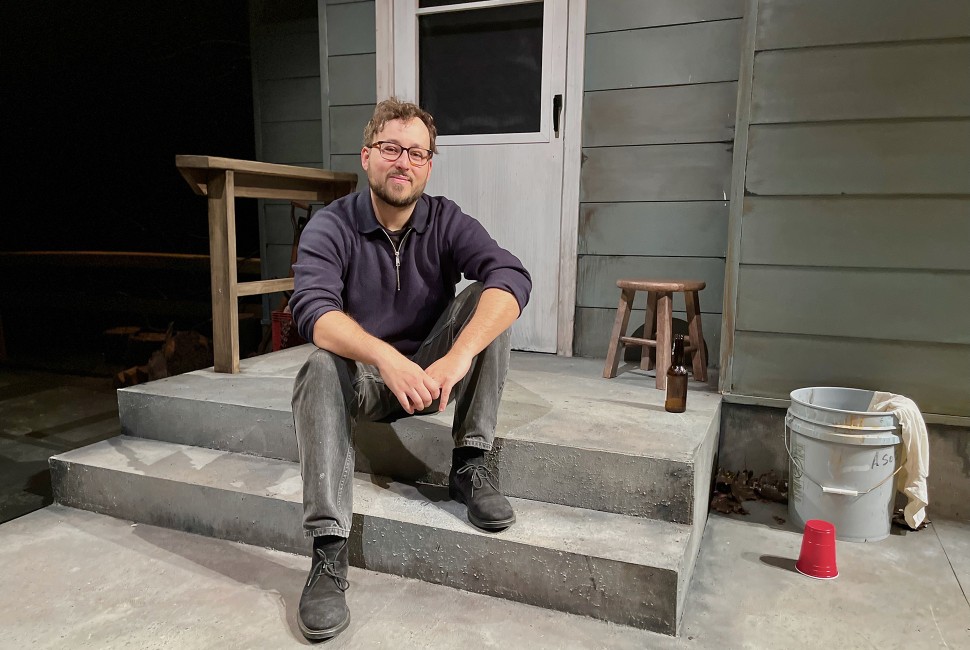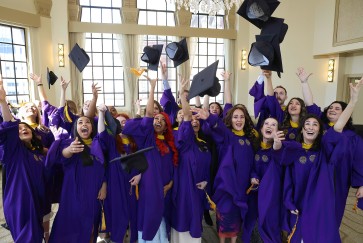When Will Arbery ’15 wrote his first political play, “Heroes of the Fourth Turning,” just two years after earning an MFA in Northwestern’s writing for the screen and stage program, he couldn’t have predicted how relevant his play would still be today.
Since the play’s premiere at New York’s Playwrights Horizons in 2019, an angry mob staged an insurrection at the U.S. Capitol on January 6, 2021, the Supreme Court overturned Roe vs. Wade in 2022, and our nation is more politically divided than ever.
Set in Wyoming, “Heroes of the Fourth Turning” follows four young Catholic conservatives who have gathered for a backyard party to celebrate the inauguration of a new president at a small Catholic college. It is August 19, 2017 — the early days of Donald Trump’s presidency and a week after the “Unite the Right” rally in Charlottesville, Virginia. As the evening progresses, political conversations get heated and the party spirals into chaos.
In what Arbery describes as a “full circle moment,” he’s returning to his grad school roots by bringing this Pulitzer-nominated play to Northwestern. “Heroes of the Fourth Turning” has its Chicago premiere at the Wirtz Center for the Performing Arts on November 17. Northwestern alumna Joan Sergay ’17, who was the assistant director on the original production in New York, is directing.
“This play is providing access to a conversation that a lot of people in the audience wouldn’t otherwise have access to,” Arbery told Northwestern Now. “It’s sort of creating a fly on the wall experience with no liberal voice present.”
Arbery says he was inspired to write the play following the presidential election of 2016 in which Hillary Clinton lost to Donald Trump and after learning of a book titled “The Fourth Turning.”
“I read it was one of Steve Bannon’s (former Trump advisor) favorite books. It argues that history goes in generational cycles and that there’s a period of prosperity followed by a spiritual awakening, then a social unraveling, followed by a crisis. One of the characters in the play, Teresa, is a fan of Bannon and believes we are in this crisis point, and she’s trying to make a case for that throughout the play,” Arbery said.
There are plenty of tense moments in the drama as characters debate tough topics like race, gender identity and whether someone who is prochoice can also be a good person.
“This play tends to unlock something for people. There’s a certain level of traditionalism that’s being looked at and there’s a range of things that these characters disagree on. The play shows that conservatism is not a monolith and that there are internal disagreements that are very important to understand.”
Arbery credits “Heroes” for helping open the writers room door to the award-winning HBO drama “Succession.” After seeing the off-Broadway production, producers of the hit series offered him a consulting job on the production. He later co-wrote episode six of season three. Arbery’s success continues now that “Succession” has ended its run on HBO. He was recently commissioned by the Metropolitan Opera to write the libretto for an adaptation of the Russian opera, “Demons.” He’s also pitching a TV show and writing a film that he plans to direct.
Writing another political play isn’t out of the realm of possibility for Arbery. But he says no matter the project, his goal as a writer and artist is to not change a viewer’s opinion. “I think our art is much more mysterious than that,” Arbery said. “Instead, I hope to inspire people to love others around them more deeply. Hopefully what I’ve done with my work is to make them reconsider some of the blanket generalizations they might have made about other groups of people. I hope that anyone who sees one of my shows has an experience that goes beyond articulation. I think the closest I can get to it is love.”


